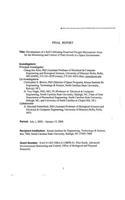
Development of a Self-Calibrating Dissolved Oxygen Microsensor Array for the Monitoring and Control of Plant Growth in a Space Environment
Series:
Plant experiments in space will require active nutrient delivery concepts in which water and nutrients are replenished on a continuous basis for long-term growth. The goal of this study is to develop a novel microsensor array to provide information on the dissolved oxygen environment in the plant root zone for the optimum control of plant cultivation systems in the space environment. Control of wa
NaN
VOLUME
English
Paperback

Plant experiments in space will require active nutrient delivery concepts in which water and nutrients are replenished on a continuous basis for long-term growth. The goal of this study is to develop a novel microsensor array to provide information on the dissolved oxygen environment in the plant root zone for the optimum control of plant cultivation systems in the space environment. Control of water and oxygen is limited by the current state-of-the-art in sensor technology. Two capabilities of the new microsensor array were tested. First, a novel in situ self-diagnosis/self-calibration capability for the microsensor was explored by dynamically controlling the oxygen microenvironment in close proximity to an amperometric dissolved oxygen microsensors. A pair of integrated electrochemical actuator electrodes provided the microenvironments based on water electrolysis. Miniaturized thin film dissolved oxygen microsensors on a flexible polyimide (Kapton(Registered Trademark)? substrate were fabricated and their performances were tested. Secondly, measurements of dissolved oxygen in two representative plant growth systems were made, which had not been performed previously due to lack of proper sensing technology. The responses of the oxygen microsensor array on a flexible polymer substrate properly reflected the oxygen contents on the surface of a porous tube nutrient delivery system and within a particulate substrate system. Additionally, we demonstrated the feasibility of using a 4-point thin film microprobe for water contents measurements for both plant growth systems. mechanical flexibility, and self-diagnosis. The proposed technology is anticipated to provide a reliable sensor feedback plant growth nutrient delivery systems in both terrestrial environment and the microgravity environment during long term space missions. The unique features of the sensor include small size and volume, multiple-point sensing, Kim, Chang-Soo and Brown, Christopher S. and Nagle, H. Troy
Price Comparison [India]
In This Series
Bestseller Manga
Trending NEWS




















